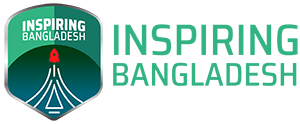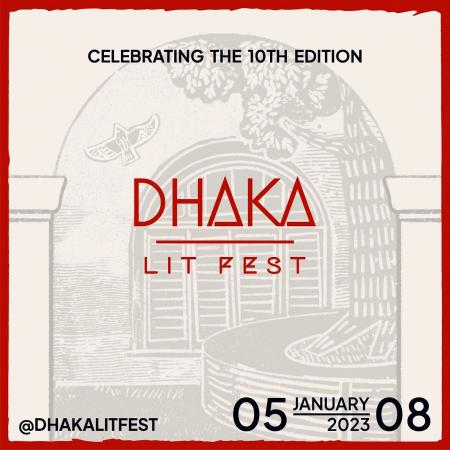The tenth edition of the Dhaka Lit Fest -- the first live festival to resume in Bangladesh since the pandemic broke out -- is introducing a ticketing system for the first time.
A section of the public has raised questions about this, and many have also spoken up in favour of it. We appreciate everyone's input into the discussion.
We acknowledge that some aspects of the new system could have been handled better by DLF, not least the manner in which it was announced. But we also feel it brings into sharp focus a debate about the value of literature, and that's a debate worth having.
To be clear, the festival has been a non-profit venture since its inception, and remains so. No one is making a profit from DLF.
Over the last decade, we have put considerable personal resources, including months of our voluntary time, to lovingly and painstakingly nurture and curate a festival that we hope would benefit Dhaka audiences.
It is a huge endeavour to put on this festival in direct financial terms. DLF bears the costs of bringing in authors from abroad and hosting them, as well as all the local costs involved to put on such an event, including artist remuneration, equipment rent, materials for stages and stalls, local transport, marketing, travel, security, etc.
Much of the negative reaction to this new measure seems to stem from the following notions or assumptions.
It was free before, so why charge now? But ticketing is the international norm for literary festivals. We maintain our programming at the highest international levels, and if we wish to continue to do so, we need to step up in this regard as well.
People have also asked how DLF can charge the public when we receive government support. We have indeed enjoyed some financial support from the government for a period of years and are very grateful for that crucial help. But even when we did so, it covered only a minor portion of our total expenses. (The major portion, as in this year, is borne by the generous support of our corporate sponsors). Given the government's budget tightening, for understandable reasons, we have not received any financial support from the government this year.
Another point raised is how we can charge when the event is held at Bangla Academy. But while the Bangla Academy is a public venue, we have to rent the premises at considerable cost. The Academy has asked for a rent of Tk21 lakh, but thanks to the kind intervention of the Minister of Culture, we hope it will be reduced by half.
To be sure, ticketing will cover only a small portion of our expenses. But we are choosing to become a ticketed event not only out of practical and financial necessity, but also as a strategic and principled matter. Ticketing is a way to ensure commitment and engagement: Paying for something makes us value it more.
When we started the Dhaka Lit Fest, we wanted to eschew tickets in order to ensure accessibility -- and attractiveness in a context where many were not used to such an event. Now, in its tenth iteration, we hope and believe our audience is ready to play a supportive role.
It also bears recalling that this is not the first furore over the literary festival. There was a time when many objected to the use of English at the Bangla Academy premises. That complaint seemed to quieten when we pointed out that this was a global festival and it was not realistic to expect most foreign authors to speak in Bangla. Furthermore, the fact that DLF is one of the best platforms for Bangladeshi writers and discussions in Bangla on Bangla literature has also been appreciated.
A section of the public has also criticized corporate sponsorships (and government support) too. As it happens, we are very careful about whom we associate with to begin with. As a literary festival, we deal with intellectual luminaries, both national and foreign, to whom we have a duty. A consequence of this is a high ethical bar, which prevents us from accepting sponsorship from certain industries and partner only with those companies we feel share the values of the lit fest.
But all of the above leads to the question: If we are to eschew corporate and government support, exactly how is such an event to be paid for? Ticketing is the only solution.
We feel we ought to depend on diverse streams of support to ensure a sustainable future for the event. And also possibly to increase our ability to keep operating with a high degree of independence and freedoms of speech and expression.
To ensure a certain independence in programming and latitude for all our speakers has always been our highest priority -- along with accessibility for all interested participants.
Ticketing in no way marks any deviation from our commitment to bringing literature to everyone who wishes to partake in it. This is precisely why we are asking for a minimal degree of support from those who will be a part of the festival.
Not only did we hope the ticket prices are reasonable in a Bangladeshi context -- and amongst the very cheapest tickets one can buy anywhere in the world, especially for the quality of programming -- we sincerely believe that they are an avenue for our audience to claim a stake in the festival.
Some members of the public have bristled at the idea of “VIP tickets.” They have misapprehended that these guests will have special access to the program, events, or speakers. Nothing could be further from the truth.
All ticket-holders will have equal access to all events and panels at the venue. This is a principle that DLF holds dear and that we are proud of.
All seating, like every year before, will be on a first-come-first-serve basis, with small exceptions for government dignitaries, sponsors, and speakers.
The VIP tickets are nothing but a form of personal sponsorship for those who can afford it. Their generous “donation,” if you will, helps us set the other tickets at very affordable prices.
Nowhere in the world, nor in history, has culture been free, nor could it or should it be. Only by paying for it are its practitioners compensated for their hard work and dedication, for their devotion to their craft.
Patronage was once limited to royalties and elites. Today that space is taken up by governments and corporates. But the freest expression often occurs in media -- books, films, music, certain types of events -- where the public pays for it directly, and especially when they bear the larger share of the product's cost.
So, while we understand the surprise and respect the criticism expressed by many at the introduction of tickets, we also hope that those who believe in culture and the arts, books and reading, and the free commingling of peoples and ideas, will see it for what it is: An opportunity to play a role as a patron.
And a chance to become a true stakeholder in an event they enjoy and in perpetuating discourses they find worthwhile.
To pay for an event like Dhaka Lit Fest is in effect to pay an homage to the very writers and speakers whose works one cherishes and whom one now gets to see live and even interact with.
Even if literature is viewed as a passion or a hobby, it needs to be paid for, as a cinephile pays for cinema tickets and streaming subscriptions, a music aficionado pays for concerts and records, a sports enthusiast pays to get into the ground, or watch it live at home.
We trust our esteemed audience to understand why tickets have been introduced and welcome one and all to celebrate the tenth anniversary of Dhaka Lit Fest with us.
Registrations Link
https://www.dhakalitfest.com/register












Comments (4)